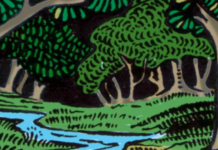
The Heretic’s Guide to Thelema
, by Gerald del Campo
Megalithica Books, 9781905713189, 434 pp. (incl. bibliography and recommended reading), 2008
“If a Holy Book were to be taken literally, there would be no point in studying magick or the Qabalah – no mystery…no excitement of the chase, and not much of a holy book either. Thelema is not a religion for the intellectually lazy.”1
The Heretic’s Guide to Thelema is comprised of three books in one. The first, New Aeon Magick: Thelema Without Tears,2 was first published by Llewellyn in 1994, while New Aeon English Qabalah Revealed
was published in 2003 by Luxor Press. The third book, The Ethics of Thelema, has never before been published and is original to Megalithica Books.
New Aeon Magick was written for his children, not to “explain Thelema in its entirety”, but to present the ideas he wanted to convey to them,3 and as such, it is written in largely in the second person. Fundamental concepts are outlined, such as basic magickal theory, quabalah, gematria, the role of gods, the Great Work, Thelemic will, the Holy Guardian Angel, and various ethical points are discussed. The recommended exercises will be familiar to Thelemites and magickians familiar with Crowley’s work, including Liber Resh, the Lesser Banishing Ritual of the Pentagram, Star Ruby, and Quabalistic Cross.
The second book, New Aeon English Qabalah Revealed, gave rise to controversy when it was first published. It comprises a new quabbalic system using the English alphabet, as opposed to earlier practices consisting largely of transliterating English words into Hebrew and Greek to derive their gematria. Yet, as Del Campo notes, “Transliteration serves no other purpose than spelling a familiar word in a foreign alphabet while trying to retain its phonetic qualities so the magician can look up its correspondences.” He continues, “The Hebrew Qabalah is used with the Hebrew language. The Greek Qabalah for the Greek language, on Greek texts. The English Qaballa,4 for holy or inspired books written in English. And shouldn’t a new Qabalah have its own unique methodology?”5 It’s a fair question, and much of the book is dedicated to defending the new quabalah, illustrating its validity with examples with The Book of the Law.
Unfortunately, the final book, The Ethics of Thelema, is the least inspired of the three offered here. Echoes of del Campo’s Catholic upbringing resound throughout The Heretic’s Guide to Thelema, but one is never more aware of this than in his discussion of various ethical points, and colours his reading of The Book of the Law such that the most aggressive and difficult passage are inexplicably softened.
The “Eleven Virtues of the Thelemic Knighthood”, a Thelemic group del Campo heads, are defined and described. Most are granted a few paragraphs to flesh out their meaning, but Pride receives three pages, including a negative stance on critical thinking6 that seems rather unfortunate.
Other sections, such as those on government, big business and consumerism read more like rants than informed opinion. Certainly the atrocities America has inflicted upon other nations is to be deplored, but these actions are not tied to a recognizable Thelemic ethic in a meaningful way, and overblown statements such as the following:
“Greed is and has always been responsible for most of the world’s woe, and an ethical person will not perpetuate an evil that causes war, pestilence, hunger, and misery to billions of his fellow humans.”7
may elicit a chuckle, but a little of that antagonistic critical thinking would have made these sections stronger. Instead, all the high-ended moralization fails to make del Campo come off any better than the unnamed straw man he continuously constructs and swats down throughout these essays.
I can’t say that this offers a “guide” to Thelema, though many may indeed find the Catholic influences heretical. Even so, A Heretic’s Guide to Thelema provides a look into del Campo’s understanding of Thelema, and that can, and should generate dialogue about what it means to be a Thelemite in the world today.
- p. 11 [↩]
- See SpiralNature.com‘s review of New Aeon Magick: Thelema Without Tears here. [↩]
- p. 14 [↩]
- This spelling is deliberate, for gematric reasons. [↩]
- p. 206 [↩]
- p. 336 [↩]
- p. 347 [↩]








